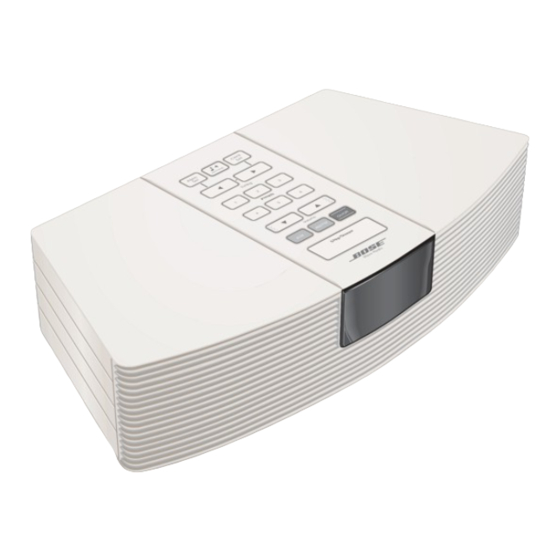Bose Wave Radio Gebruikershandleiding - Pagina 3
Blader online of download pdf Gebruikershandleiding voor {categorie_naam} Bose Wave Radio. Bose Wave Radio 16 pagina's. Owner's guide
Ook voor Bose Wave Radio: Gebruikershandleiding (20 pagina's), Gebruikershandleiding (12 pagina's), Handleiding voor snelle installatie (1 pagina's), Gebruikershandleiding (27 pagina's), Gebruikershandleiding (26 pagina's)

For your safety
1. Read, Follow And Save All Instructions – Read and follow the complete safety and operating
instructions in this owner's guide before using the unit. Save this guide for future reference.
2. Pay Attention To Warnings – Observe all warnings on the unit and in the guide.
3. Do Not Let Objects Or Liquid Enter The Unit – Take care to prevent objects or liquids from
entering this unit. Do not use near a bathtub, washbowl, kitchen sink, laundry tub, in a wet base-
ment, near a swimming pool, or anywhere else that water is present. Clean only as directed on page
13.
4. Maintain Proper Ventilation – Place the unit so nothing interferes with its proper ventilation. Do not
place on a bed, sofa, or similar surface that may block the ventilation openings. Do not put it in a
bookcase or cabinet that may keep air from flowing through its ventilation openings.
5. Avoid Excessive Heat – Do not place the unit near heat sources such as radiators, stoves, or other
appliances (including amplifiers) that produce heat.
6. Use Proper Power Sources – Plug the unit into a proper power supply, as described in the
operating instructions or as marked on the unit. This unit has a polarized alternating current line plug
(one blade is wider than the other). As a safety feature, the plug fits into the power outlet only one
way. If you have trouble inserting it, reverse the plug. If it still does not fit, your outlet may be
obsolete and needs to be replaced. Contact an electrician. Do not change the plug to defeat this
safety feature.
7. Protect The Power Cord – Route all power cords so that they are not likely to be walked on or
pinched. Pay particular attention to cords at plugs, at the point where the cord connects to the unit,
and at outlets on the unit.
8. Take Precautions When Unit Is Not In Use – If the unit will not be used for an extended period,
unplug from the outlet and remove the batteries.
9. Be Careful With Carts And Stands – Do not place this unit on an unstable cart, stand, tripod,
bracket, or table. The unit may fall, causing serious injury to a person or damage to the unit. For
advice on use of a particular cart, stand, tripod, bracket, or table, contact Bose
10. Avoid Power Lines – Do not install external antennas near overhead power lines or other electric light
or power circuits, nor where an antenna can fall into such circuits or power lines.
11. Ground All Outdoor Antennas – If an external antenna or cable system is connected to this unit, be
sure the antenna or cable system is grounded. This will provide some protection against voltage
Ground
Clamp
Electric
Service
Equipment
12. Obtain Authorized Service When It Is Indicated – Do not attempt to service this unit yourself. All
servicing should be provided by authorized service personnel when:
A. The power supply cord or the plug has been damaged, or
B. Objects have fallen or liquid has spilled into the unit, or
C. The unit has been exposed to rain, or
D. The unit does not appear to operate normally or exhibits a marked change in performance, or
E. The unit has been dropped or the cabinet damaged.
AM149204_02_V.pdf
surges and built-up static charges.
Section 810 of the National
Antenna
Electrical Code ANSI/NFPA No. 70
Lead In Wire
provides information with respect to
proper grounding of the mast and
supporting structure, grounding of
Antenna
the lead-in wire to an antenna
Discharge Unit
(NEC Section 810-20)
discharge unit, size of the ground-
ing conductors, location of
Grounding
Conductors
antenna-discharge unit, connection
(NEC Section 810-21)
to grounding electrodes, and
Ground Clamps
requirements for the ground
Power Service Grounding
Electrode System
electrode. Refer to the antenna
(NEC ART 250 Part H)
grounding illustration.
January 7, 2002
Safety Instructions
®
Corporation.
If you must move the unit and cart
combination, do so very carefully.
Quick stops, excessive force, and
uneven surfaces may cause it to
overturn.
Note to CATV system
installer:
This reminder calls the CATV
system installer's attention to
Article 820-40 of the NEC (of
USA) that provides guidelines for
proper grounding. It specifies that
the cable ground shall be
connected to the grounding
system of the building, as close to
the point of cable entry as is
practical.
3
